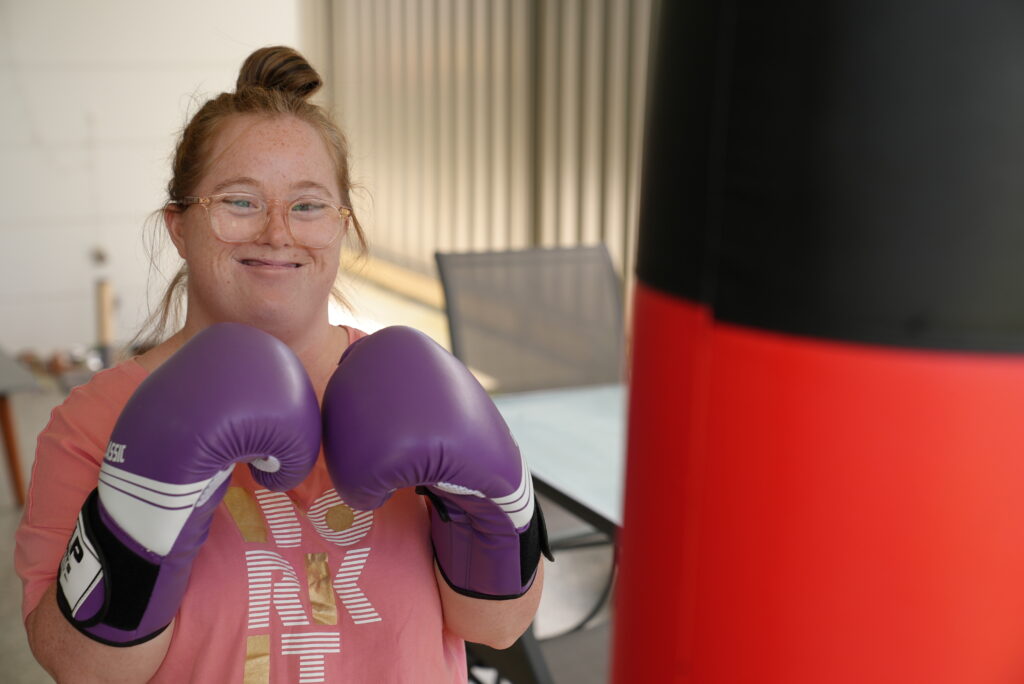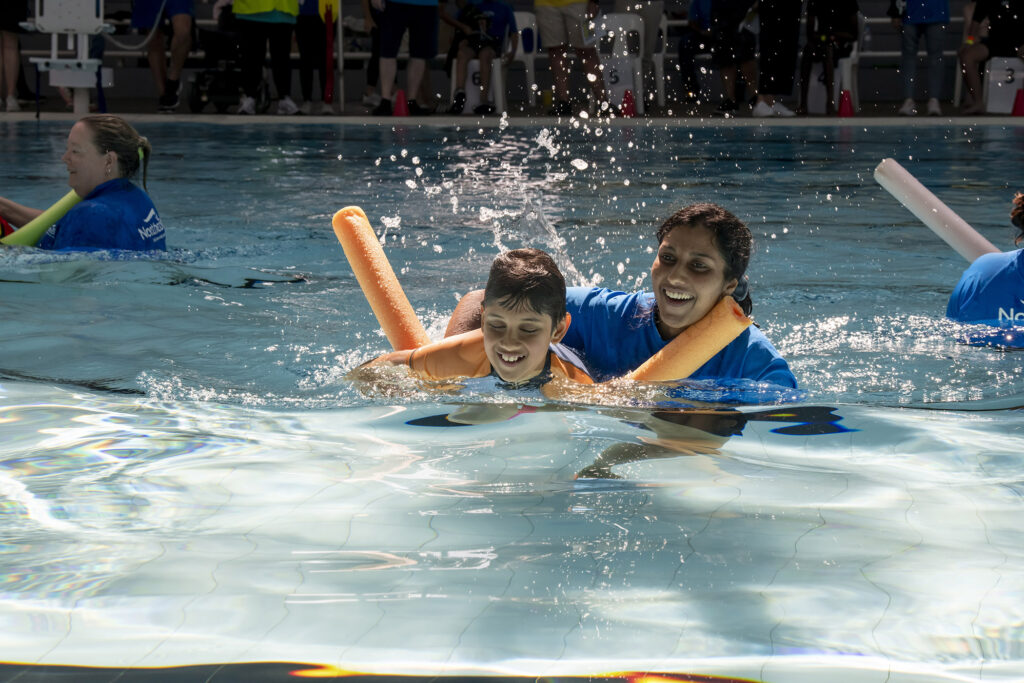Jan 12, 2024
Support for autism and sensory disorders

Many families will see behaviours relating to ASD before receiving a formal diagnosis. Families will often be seeking services to help their child but also support the whole family.
Sensory processing disorder is strongly linked to an ASD diagnosis but can exist separately. It is a condition where an individual has difficulty receiving and responding to information that comes in through their senses. This may mean they misinterpret everyday sensory information, such as sound, touch and movement.
Support from Occupational Therapists and Speech Pathologists is particularly helpful for children and young people with these conditions. Physiotherapists and Social Workers also have an important role to play as part of your multidisciplinary team.
Diagnosing ASD
To be diagnosed with Autism Spectrum Disorder (ASD) you will be assessed across two domains: 1) Social communication and social interaction; and 2) Repetitive or restricted behaviour, interests or activities.
The criteria for diagnosis provides for three severity levels (1 to 3) to reflect the impact on daily life. These ratings can vary across a persons life.
Why Northcott?
Your choice of support provider is important. As a parent or a referrer, you want to ensure that the service provider has the knowledge and experience necessary to support you on your journey through key life transitions.
How we can support you or your child
Newly diagnosed with autism or sensory processing disorder
An autism diagnosis may come after what feels like a lengthy period of assessment and discussion with health professionals. Many children are not diagnosed until early schooling or later. Some adults are diagnosed in later life.
Northcott is here to help you navigate through the early days of diagnosis, whenever it is received. For younger children, we’ll focus on early goals that can make a real difference in your child’s quality of life. Your Northcott multidisciplinary team includes Physiotherapists, Occupational Therapists, Speech Pathologists and Social Workers. This means that additional supports can be accessed quickly and easily.
Improving communication skills
Children with ASD can face challenges in communicating their feelings and needs. Parents, carers, teachers and others may similarly feel it is difficult to connect and make themselves understood. Northcott Speech Pathologists can provide significant assistance in developing language and communication skills including using Assistive Technology.
Emotional regulation
Communication and cognition differences with ASD children can lead to frustration and outbursts. Northcott therapists can support behaviour interventions to reduce or eliminate harmful behaviours or those that interfere with learning. Social work support can also assist.
Supporting parenting
Understandably parents can feel challenged by a diagnosis. You may be unsure how to interact with your child, communicate and help manage their emotions. We understand this and Northcott therapists will work with your family to feel confident in interacting with your infant, engaging them with play and reading their cues.
Considering sensory needs
Northcott therapists are experienced in identifying sensory needs. Some children need a lot of stimulation to be able to focus on a task, others can quickly become overwhelmed by stimulation. Getting this balance right is important especially in school or in the community.
Early Years support for autism and sensory processing disorder
Early years support revolves around supporting the whole family, encouraging play, building connections to others, emotional regulation and developing language and communication skills.
Physiotherapists, Occupational Therapists and Speech Pathologists can all have an important role to play at this time.
Northcott Supports for early years
Improving communication skills
Supporting communication is central to working with children with ASD. Your Speech Pathologist may focus on goals such as increasing word frequency / sentence length and conversational speech. Your Occupational Therapist could be looking at sensory regulation, fine motor skills and gross motor skills. Together, they will work on group social skills and other identified goals.
Identifying Assistive Technology needs
A wide range of Assistive Technology can be accessed under the NDIS, privately and other funding sources. For example, children who struggle with writing using pen and paper can explore a wide range of alternative assistive technology options such as small and large keyboards, note takers. We can advise on specialised software offering various supportive features and functions. Some children will benefit from the use of alternative/augmentative communication, known as AAC.
Making social connections
Children with ASD can be confused and upset by the difficulties they may experiencing in connecting with others. Supporting them to understand “playground” norms and how to play and interact can be a significant help.
Everyday life skills
Support can be provided for motor skills such as getting dressed, playing games, and using the toilet.
Working on sensory goal
Northcott therapists are experienced in identifying sensory needs. Some children need a lot of stimulation to be able to focus on a task, others can quickly become overwhelmed by stimulation. Getting this balance right is important especially in school or in the community.
Support for school-aged children with autism
Starting kindy and prep is a step up for all children. For children with ASD, it can be quite overwhelming and distressing. Parents may be unsure how to support their child to succeed. For some families, it is only at this stage that they seek or receive a formal diagnosis of ASD.
Northcott therapists can help families understand what to expect and work collaboratively with other therapists to achieve age-appropriate goals. Support can also be provided to access NDIS funding.
Starting and succeeding at School
Starting school is a big milestone but it can also present new challenges as children experience a new environment. School routines, expectations, teachers etc also change over the school year and we understand that change can cause significant anxiety. Your Northcott therapist can support you to work through this and set children with autism up for the best start at school and for ongoing participation. School is also full of sensory stimulation and help from a therapist to make adjustments can mean children with ASD can learn and be comfortable.
Queensland schools are resourced to provide additional support for students with disabilities. Your therapist can help engage with your school to facilitate meeting your needs and suggest necessary accommodations.
Collaborating with school staff to set up goals and measure outcomes
Your Northcott therapist can work with your teacher through meetings, education and training to help them understand your support needs in the classroom. Northcott Queensland also provides support at school through the Specialist Disability Support in Schools (SDSS) Program.
Improving communication and social skills
Supporting communication at school is a common goal for children with autism. Your Speech Pathologist may focus on goals such as increasing word frequency / sentence length and conversational speech. Your Occupational Therapist could be looking at sensory regulation, fine motor skills and gross motor skills. Together, they will work on group social skills and other identified goals.
Changing Assistive Technology needs
Participation at school will often be improved through the use of alternative/augmentative communication, known as AAC. This could be “no-tech” such as sign language, “low-tech” such as PODD books or cue cards, or “high-tech” such as interactive communication boards or a speech generating device.
Making social connections
Children with ASD can be confused and upset by the difficulties they may experiencing in connecting with others. Supporting them to understand ‘playground norms’ and how to play and interact can be a significant help.
Working on motor skills
Children living with ASD sometimes need support with exercise and can be less physically active than other kids their age. While children with ASD mostly have challenges with their social communication skills and sensory behaviours, they may also have motor skill difficulties, poor motor planning and/or poor coordination. Support can be provided for motor skills including those required for playground games and school sport. Enhanced participation in these areas can boost self–esteem as well as physical development.
Working on sensory goals
Northcott therapists are experienced in identifying sensory needs. Some children need a lot of stimulation to be able to focus on a task, others can quickly become overwhelmed by stimulation. Getting this balance right is important especially in school or in the community. The Northcott Team can also work with your school to advise on the environmental factors that contribute to sensory issues.
Support for older children and young adults with autism
Many parents are concerned about the next steps after school for their child. As with all times of transition, it can be an uncertain period as new support needs emerge and young people consider new goals as an adult. This can also be an exciting time to develop independence.
Support at this time in life is likely to work on building connections to others, emotional regulation, and adjusting language and communication skills to new settings. Anxiety can be a significant issue for people with autism – help with setting routines from an Occupational Therapist and additional Social Work support can help.
What support is there for older children and young adults with autism?
Continued support at school
Assistive Technology needs can change as students move through High School toward further education or the workplace. Support from Northcott therapists can assist you in keeping up with peers with communication and social skills.
Support with physical development
Children living with ASD may continue to get less active as they get older, and consequently miss out on valuable opportunities for social interaction, like playing sport with their peers.
Developing goals
Your Northcott therapist can help you develop and work on goals for post-school. This might be how to access further education, prepare for employment or develop life skills
Supporting independence
As you grow older you might like to catch your own transport, move out of home, holiday independently from your family and pursue a job. The team at Northcott can help you develop new skills to cope with new situations and new groups of people.
Developing new interests and hobbies
Once you leave school you may have more time for extra interests and hobbies. Hobbies are a great way to meet new people and learn new life skills. Our Lifestyle & Leisure group run day programs to help you be active, learn new skills and have fun.
Connecting with the community
Having a connection to your local community is important in feeling valued and contributing to society. This can be particularly important at times of change and transition such as moving from school to further education or moving into the workplace. Support is available from Northcott to connect and engage with new people.
Short and Medium Term Accommodation
Our Getaway on the Gold Coast provides Short and Medium Term Accommodation with ensuite private rooms and 24 hour support. The team support short periods of respite, time away from home, supported holidays and longer stays where required.
Support for adults with autism
As an adult with ASD, it may feel like there is less support available as you move from school into other settings. Northcott therapists understand this is an important period of transition and can provide support with managing anxiety, social connections, understanding workplaces, relationships and difficulties with routines and sleep.
We also recognise that some people are not diagnosed with autism until later in life. Therapy and Social Work can still provide benefits in understanding the diagnosis and providing support to manage communication and connections.
What support is there for adults with autism?
Developing communication skills
Becoming an adult usually brings greater responsibilities to communicate for yourself – this could include with medical services, employers and friends. We can continue to advise on communication techniques and strategies and support alternative communication methods (AAC) where required.
Supporting independence
As you grow older you might like to catch your own transport, move out of home, holiday independently from your family and pursue a job. The team at Northcott can help you develop new skills, overcome accessibility barriers and work with other organisations who may not be as aware of autism to get the support you need.
Building social connections
Having a connection to your local community is important to feeling valued and contributing to society. Additional supports can be useful as you move from university to the workplace or into new accommodation in a different area.
Occupational Therapy Speech Therapy Physiotherapy Early Childhood


Accessibility and Inclusivity
We respect and honour Aboriginal and Torres Strait Islander Elders past, present and future. We acknowledge the stories, traditions and living cultures of Aboriginal and Torres Strait Islander peoples on this land and commit to building a brighter future together.
Read more about our commitment to reconciliation

